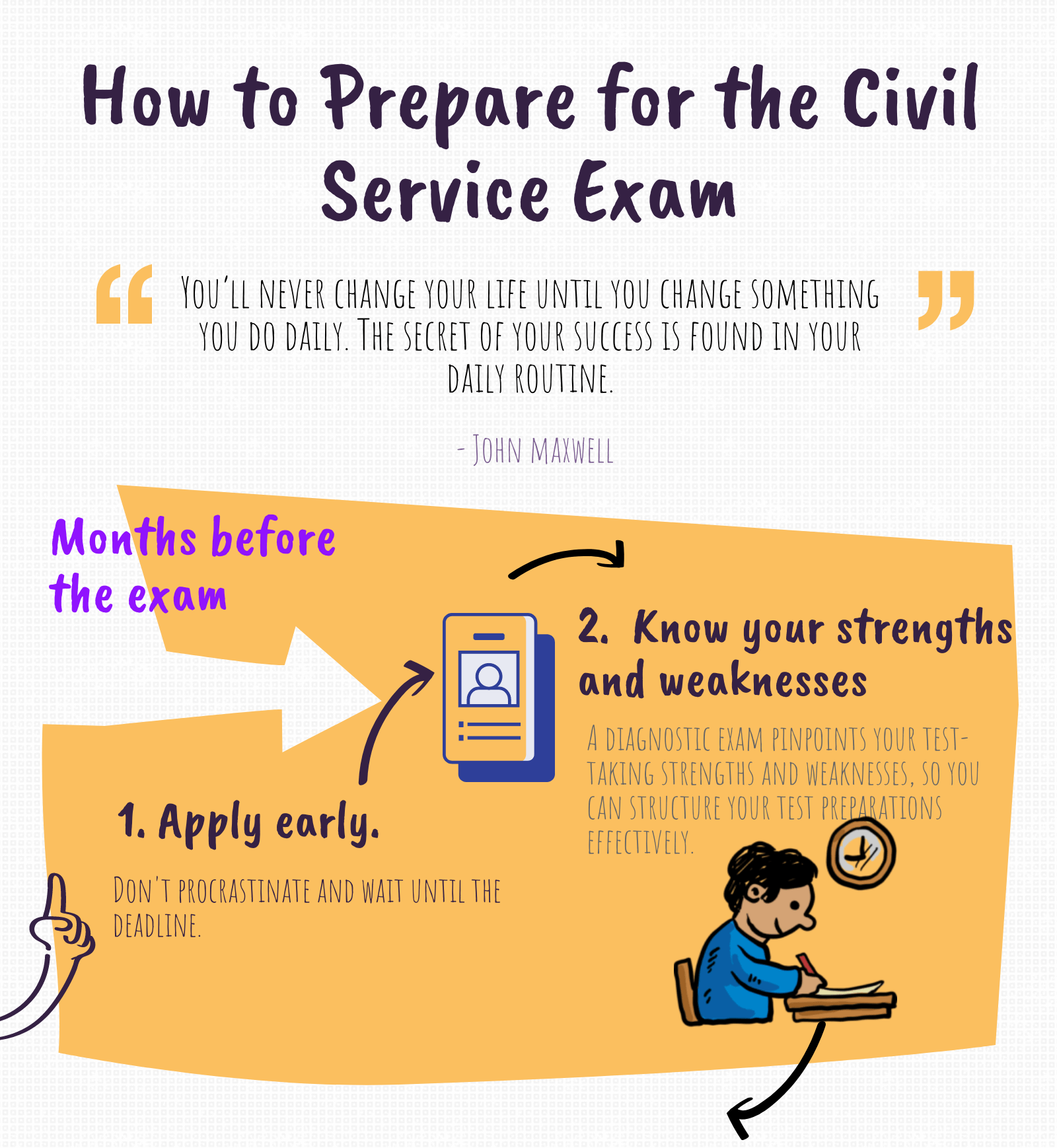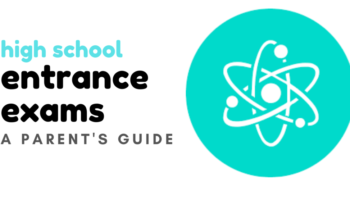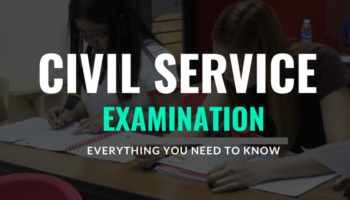How to Prepare for the CSE Exam the RIGHT WAY

Preparing for the CSE exam is definitely stressful especially for those who have been working for a long time already and have completely forgotten everything they learned in elementary and high school. Because of technology, we have been too dependent on calculators that we don’t even remember how to add, subtract, multiply or divide decimals. Most people cannot find the time to read after working an 8-hour job. This article will help you study effectively in preparation for the exam.
I have listed the things that you need to do before and during the exam that will greatly improve your chances of passing the exam.
Months before the exam
1. Apply early.
Don’t procrastinate and wait until the deadline. Many aspiring applicants bought numerous reviewers without even bothering to check the deadline of application. Applying for the exam is always the FIRST step in preparing. Check out the schedule of application and exam date at the CSC website.
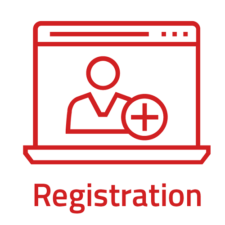

2. Know your strength and weakness.
A diagnostic exam pinpoints your test-taking strengths and weaknesses, so you can structure your test preparations effectively. After taking the diagnostic exam, review your performance by asking yourself these questions:
1. Did you feel anxious at any point during the exam?
2. Were you able to complete each section within the allotted time? Looking back, were there certain questions that were excessively time-consuming?
3. How did you react if/when you realized you were behind on time?
4. What types of questions seemed straightforward to you?
Once you’ve contemplated these questions, consolidate your findings into your strongest and weakest areas. This will allow you to identify types of questions that should give you a confidence boost, as well as those worth studying. Also, if timing or anxiety was an issue, you can make a plan to address these concerns as you continue practicing. Lastly, if you think that you have major weaknesses or anxiety, consider contacting a tutor or a review center to help you successfully sail through the rest of your preparations.
3. Review daily.
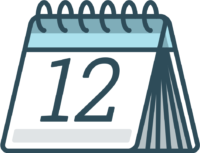
The famous American author John Maxwell said:
“You’ll never change your life until you change something you do daily. The secret of your success is found in your daily routine.”
You have to add preparing for the exam in your daily routine.
Spend at least 30 minutes solving problems in math. Spend another 30 minutes in reading articles/novel to improve your vocabulary and reading comprehension skills. If you study three months before the exam, this means having 90 hours of review for preparation.
How should I study for 30 minutes effectively for each subject?
The Pomodoro technique can help you with that. This technique simply involves choosing a task and working on it for 25 minutes straight (yes, without distractions like your mobile phones, etc.), taking a 5-minute break and repeating the cycle. Watch this video to understand it fully how it works.
What should I study?
You may access our online course here for FREE. This online course has a series of lectures and quizzes at the end to measure your understanding of the material. Try it out NOW!
You may also watch this video to help you study even if you do not feel like it.

4. Memorize your multiplication table.
Since calculators are not allowed during the test, it is very important that you memorize your multiplication table. You will not be able to divide, nor perform any operations on fractions and decimals if haven’t memorized it.
5. Analyze the questions, don't memorize.
When using online reviewers, do not memorize the answers to the questions for we do not know if the same question will appear on the exam itself. These questions are there to train your mind to think. Remember that your brain is a muscle and it needs constant training to strengthen it. Analyze the questions carefully and if you got the wrong answer, make sure you understand why you were wrong. If you do not understand it, try to find a tutor or a review center that can help you.
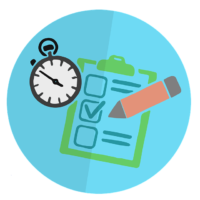
6. Practice, practice, practice.
According to a study, practice testing is the most effective way of studying. You can do practice testing through review quizzes online. Testing yourself works because you have to make the effort to pull information from your memory — something we don’t do when we merely review our notes or reread something. However, note that this has the assumption that you already read something beforehand. Doing lots of practice without prior reading will not help you since you do not have the necessary information that you need to answer the questions. If you will look at our online course, each section is composed of a lecture (for you to read) and a quiz so that you can test yourself if you were able to apply the concepts that were taught.
When taking a practice test or just studying, preparing, put yourself in a place where you can maintain mindful focus for an extended time. Do not study or take your tests on your bed. Your bed is a place for sleep, not study. When you recline, your brain becomes less alert. You can’t study well if one part of your brain is sending sleep signals to the other parts! Instead, sit in a quiet area. Sit in an upright chair at a table or desk with good lighting. This makes it easier for your brain to absorb new
information and solve new problems.
7. Avoid cramming and procastination.
According to studies, cramming contributes significantly to testing anxiety, which can make you perform poorly on the test. Worse, it may lead to mental block. Most Filipinos have this notion that if we study right before the an exam, we will be able to remember it more since it is still fresh from our memory. That is certainly NOT TRUE.
Here is a detailed list of reasons why you should not cram:

a. Spacing Effect
The spacing effect says that given the same amount of time studied, or the same number of exposures to material, those spread out in time will be remembered better, at longer intervals, than if those same exposures are crammed together.
In other words, if you have ten hours to study, you’ll retain more if they are spread one hour per day over ten days, than if you study ten hours straight.
Spreading out the number of hours of studying leads to storing the information in long-term memory instead of storing it in our short-term memory (which is what happens when we cram).
b. Less Information Stored
When you study long hours straight, you get tired and this decreases your ability to absorb further information.
Although we know that cramming is not good, why do we still do it anyway? The reason is PROCRASTINATION. If you start doing whatever you need to do, you do not have to cram. The video below can help you stop procrastinating.
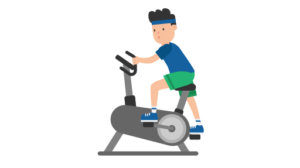
8. Train your body.
There are two great reasons to combine a regimen of vigorous physical exercise with your preparation for the CSE.
a. Physical health yields mental benefits.
Those who are in good physical shape can focus longer and think faster than those who don’t exercise.
b. The task of getting your body in shape teaches you a lot about getting your mind in shape.
When you are training to run a race like a marathon, for instance, you learn quickly that consistency pays off. Getting out there every day and logging miles is critical. Similarly, consistency pays off in CSE prep. If you set aside only one day a week to do your work, you won’t see nearly as much benefit as if you had spread it out over the week. Also, physical training teaches you to listen to your body; you learn when it’s okay to push yourself hard, and when you need to ease up. Similarly, good training teaches you to listen to your mind; you learn which problems you can tackle easily, which are challenging but manageable, and which ones to skip. This will help you enormously on test day.
Here are some tips that you can do to train your body:
a. DO RELAXATION TECHNIQUES.
You can find a lot of these techniques here.
b. LOOK AT YOUR MATERIAL HEAD ON, NOT AT AN ANGLE.
You will find it much easier to read when your book is facing you directly, rather than at an angle.
As an exercise, try to read both ways. You will notice that your brain has to work harder to process the
words when the book is at an angle. Don’t make things harder than they need to be.
c. TAKE SHORT BREAKS WHEN YOU FEEL FATIGUED.
Again, this is from the Pomodoro technique. Whenever you begin to feel fatigued from studying,
take a five-minute break. But be strict—don’t let your break get out of hand. Five minutes is enough time to get a snack or use the bathroom but not long enough to do much else. Don’t take a break to watch your favorite show; you can do that after your study hour is done. But a good short break can provide a great energy boost in the midst of your studying.
d. EAT SMART AND GET A GOOD REST.
Don’t think that your brain will work just fine even if you neglect its basic needs. Here are some things you should remember during the days of your preparation.
- Drink at least 5 glasses of water everyday.
- Take a good multivitamin supplement.
- Eat protein with every meal.
- Eat whole grains and lots of vegetables.
- Treat sleep like an appointment.
One day before the exam
1. Relax and sleep early.

The night before the CSE, your studying should all be behind you; cramming at this point will probably do more harm than good. Relax, go see a movie, grab dinner with your friends, do whatever you need to do to reward your brain for its efforts over the previous months. As long as you get a good night’s rest, you’re allowed to have some fun the evening before the exam. However, make sure that you still get enough sleep. For a truly peaceful slumber, lay out everything you need for test day the night before.
2. Get all your stuff together.
The night before the test, lay out everything you will need for the test on your bed.
The day of the exam

1. Eat a power breakfast.
Eat a good breakfast before the exam, with protein to give your brain the energy it will need. Oatmeal is
a good option, or eggs and bacon. Make sure that you have enough food to sustain you during the exam but don’t overeat also! Overeating can cause reduce brain function. Try to stay away also from too much sugar.
2. Dress comfortably.
Wear clothes that will keep you comfortable. Bring a light coat or jacket in case you get cold. However, take note that following are not allowed: sleeveless shirt/blouse, short pants, or slippers.


3. Arrive early.
If you will be taking the CSE at an unfamiliar test site, make sure to get directions to the site well
ahead of time. Go to the testing site days before the exam before the test, so you can familiarize yourself with it. Leave yourself plenty of time to get to the test site 1 hour earlier so that you don’t stress out if you hit traffic (especially if you would have to pass through EDSA). Testing sites will be open at 6:00 am.
4. Relax.
You do not want to have a mental block on this day so you’d better relax. You can say a simple prayer or do some positive talk. You may also have some deep breathing to set your mind and body to relax. You can even chat with your roommates (if they seem friendly) just to get your mind out of worry state.


5. Be mindful of time.
- Bring a watch if necessary so that you can keep track of time.
- Don’t waste too much time on any one question.
If you have no idea as to how to answer a question take note of that item, skip it on your answer sheet and come back to it later. If you return to the problem 10 or 15 minutes later, your refreshed brain may well see things more clearly and find a simple way to solve the problem! If you still do not know the answer, guess. You have a 25% chance of getting the correct answer anyway compared with the 0% chance if you leave it unanswered.
- For reading comprehension, try looking at the questions (but not the answers) before you read the passage. In this way, you already know what to look for in the passage.
6. Don't give the right answer to the wrong question.
Don’t go so fast and excited that you answer the wrong question when doing a math problem. Always re-read the question to make sure you are giving the answer to the question it asks!

Conclusion
Preparing for the civil service exam would really entail months of preparation. Although there is no magic formula for you to pass, these tips would definitely help you along the way.
Here is an infographic that summarizes what was covered in this blog post. Enjoy!
